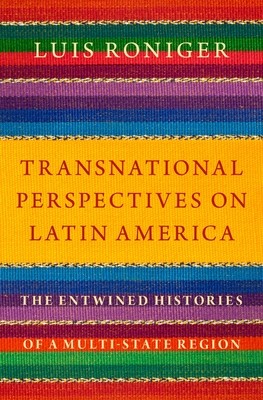
- We will send in 10–14 business days.
- Author: Luis Roniger
- Publisher: Oxford University Press, USA
- ISBN-10: 0197605311
- ISBN-13: 9780197605318
- Format: 15.8 x 22.4 x 3.3 cm, hardcover
- Language: English
- SAVE -10% with code: EXTRA
Reviews
Description
Latin America is a region made up of multiple states and societies with a diversity of races, ethnicities, and cultures. These states share historical legacies, cultural backgrounds and institutional frameworks, as well as political and socioeconomic challenges--but can one say they share a
regional perspective, if such perspectives even exist?
the affairs of neighboring states have shaped the region's modern character as much as the process of nation-state formation. Geopolitical, sociological, and cultural trends molded a contiguity of influences, leading sometimes to state confrontations, but overall, shaping a transnational arena of
connected histories, interactions, and visions, complementing the process of separate nation-state formation. The book offers fresh readings of the dynamics of this region of multiple societies that have shared historical and cultural connections and developed divergent paths while unable to fully disengage from one another. Its chapters analyze persisting forms of circulation and articulation of networks,
practices and ideas crossing international borders. Among the topics covered are political exile; the interface of state building and transnationalism; wars and the diffusion of conspiracy theories; the transnational imprint of the Cold War and democratization; social movements and transnational
solidarity; states' geopolitical shifts and their impact on Jewish and Muslim citizens. The book closes with a chapter on twenty-first century dilemmas and challenges, including the process of segmented regional integration, state accountability, the vitality and limits of citizenship regimes, and
pandemic politics.
EXTRA 10 % discount with code: EXTRA
The promotion ends in 17d.03:29:15
The discount code is valid when purchasing from 10 €. Discounts do not stack.
- Author: Luis Roniger
- Publisher: Oxford University Press, USA
- ISBN-10: 0197605311
- ISBN-13: 9780197605318
- Format: 15.8 x 22.4 x 3.3 cm, hardcover
- Language: English English
Latin America is a region made up of multiple states and societies with a diversity of races, ethnicities, and cultures. These states share historical legacies, cultural backgrounds and institutional frameworks, as well as political and socioeconomic challenges--but can one say they share a
regional perspective, if such perspectives even exist?
the affairs of neighboring states have shaped the region's modern character as much as the process of nation-state formation. Geopolitical, sociological, and cultural trends molded a contiguity of influences, leading sometimes to state confrontations, but overall, shaping a transnational arena of
connected histories, interactions, and visions, complementing the process of separate nation-state formation. The book offers fresh readings of the dynamics of this region of multiple societies that have shared historical and cultural connections and developed divergent paths while unable to fully disengage from one another. Its chapters analyze persisting forms of circulation and articulation of networks,
practices and ideas crossing international borders. Among the topics covered are political exile; the interface of state building and transnationalism; wars and the diffusion of conspiracy theories; the transnational imprint of the Cold War and democratization; social movements and transnational
solidarity; states' geopolitical shifts and their impact on Jewish and Muslim citizens. The book closes with a chapter on twenty-first century dilemmas and challenges, including the process of segmented regional integration, state accountability, the vitality and limits of citizenship regimes, and
pandemic politics.


Reviews